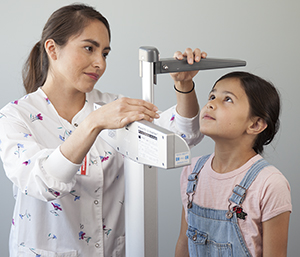Diabetes and Your Child: Tests and Vaccines
Taking care of your child’s diabetes every day helps keep them healthy. It also lowers the risk of health problems for them later in life. But most children with diabetes also need to see their healthcare provider for checkups at least 4 times a year. Your child will need some tests. These tests help show if your child’s treatment plan is working. The provider will also keep your child up to date with needed shots (vaccines). These visits are a good opportunity for your child to learn a bit more about diabetes and how they can help you with their diabetes care as they get older.
Tests

These are the most common tests that children with diabetes need. These tests should be done as often as stated below, unless the healthcare team gives you other advice:
-
Height and weight (every visit). Checking your child’s growth tells you if your child’s overall health is good.
-
Blood pressure (every visit). Blood pressure checks are used to watch the health of your child’s heart and blood vessels.
-
A1C (every 3 months). This test measures your child’s average blood sugar level over a few months.
-
Urine albumin and albumin to creatinine ratio (ACR) tests (1 time a year). This test shows if your child’s kidneys are working well.
-
Lipids (every 1 to 3 years). This test looks at blood fats (lipid levels) to check blood vessel health.
-
Thyroid function (every 1 to 2 years). This test checks the level of your child’s thyroid hormone, which helps with growth. People who have diabetes are more likely to lose their ability to make thyroid hormone.
-
Celiac disease (At diagnosis, repeat within 2 years, then after 5 years, or if gastrointestinal symptoms develop). This test checks for an antibody. The antibody may mean that your child’s digestive system is not working well because of an allergy to gluten in wheat. About 10% of people with type 1 diabetes have celiac disease. Your child’s healthcare provider might advise testing earlier or more often.
-
Dilated eye exam (onset and frequency of exams vary). Once your child has had diabetes for 3 to 5 years, a dilated eye exam is generally recommended every 2 years starting at age 11 (or onset of puberty if earlier). Your child’s healthcare provider might advise testing earlier or more often. Eye exams look for damage to the blood vessels in the eyes (retinopathy).
-
Feet (every visit). The feet are checked for pressure areas, injuries, or sores.
-
Psychosocial assessment (every 3 months). This screens for depression, anxiety, school absences, family conflict, and other mental health challenges. Children with diabetes and their families are at increased risk for psychological disorders, which result in poor blood sugar control.
Vaccines
Your child should get the vaccines below. These are in addition to the recommended routine childhood vaccines:
-
Influenza vaccine (1 time a year). This is also called a flu shot. Having the flu can make it harder to keep your child’s blood sugar levels healthy.
-
Pneumonia. Pneumonia can be a serious problem for children with diabetes. Ask your child’s healthcare provider how often your child needs this vaccine.
-
COVID-19. Children with diabetes may be at an increased risk of severe illness and complications when infected with COVID-19.
Seeing the dentist
Your child should see a dentist at least 2 times a year. This is because high blood sugar can harm your child’s teeth and gums over time. Poor dental care at home can also raise blood sugar. Make sure your child brushes and flosses their teeth at least 2 times a day. Tell anyone who works on your child’s teeth that your child has diabetes.
Where to learn more
For more information about diabetes, visit these websites:
-
American Diabetes Association www.diabetes.org
-
Children with Diabetes www.childrenwithdiabetes.com
-
Juvenile Diabetes Research Foundation www.jdrf.org
-
American Association of Diabetes Educators www.aadenet.org
-
American Association of Clinical Endocrinologists www.aace.com
-
Endocrine Society www.endocrine.org/topics/diabetes
-
National Diabetes Information Clearinghouse www.diabetes.niddk.nih.gov
This sheet does not give all the information you need to care for your child with diabetes. Ask your child’s healthcare provider for more information.